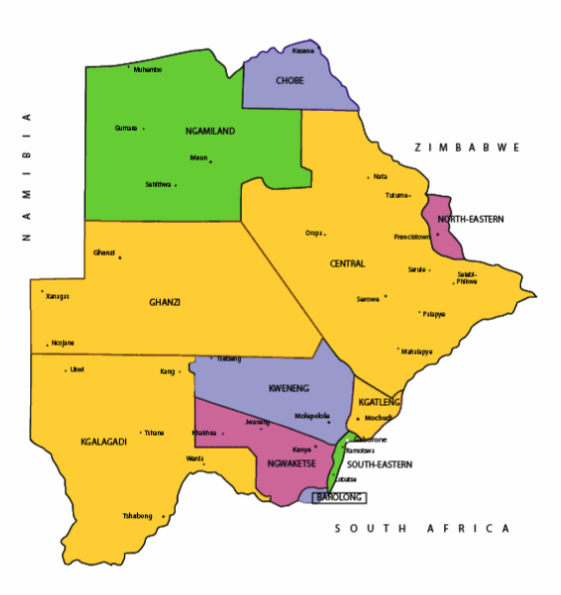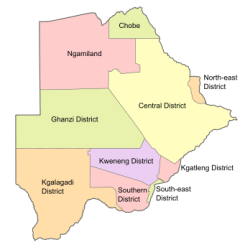Places and their polling stations in Mmadinare, Botswana
130 Mogapi
0655 Mogapi Primary School
0656 Mogapi Community Hall
131 Sefhophe
0657 Sefhophe Primary School
0658 Sefhophe JSS
0659 Motsholapheko Primary School
132 Tobane-Tshokwe
0660 S & Cd Office
0661 Tobane Primary School
0662 Motlhasedi JSS
0663 Tshokwe Primary School
133 Mmadinare-Robelela
0664 St. Peters Primary School
0665 Robelela Primary School
0666 Kelele Primary School
134 Mmadinare-Damochujenaa
0667 Sedibe Primary School
0668 Mmadinare Primary School
0669 Phethu Mphoeng Primary School
0670 Merementsi JSS
135 Tamasane
0671 Tamasane Primary School
0672 Maotokgonyane (Tent)
136 Kgagodi-Diloro
0673 Kgagodi Primary School
0674 Diloro Primary School
0675 Kgagodi Kgotla
137 Mogapinyana
0676 Mogapinyana Primary School
0677 Setote Mobile Health Stop (Tent)
138 Mmadinare South
0678 Makome JSS
0679 Veterinary Office
0680 Lebala Cattle Crush (Tent)
0681 Tapalakoma Primary School
0682 Letsibogo Primary School
Reference: iec.gov.bw/index.php/electoral-districts/polling-stations.html
Botswana
Botswana is a country in Africa. It is topographically flat, with approximately 70 percent of its territory being the Kalahari Desert.
It is bordered by South Africa to the south and southeast, Namibia to the west and north, and Zimbabwe to the northeast.
Capital: Gaborone
Currency: Botswanan Pula
Official language: English
Population: 2.588 million (2021) World Bank
Dialing code: +267
Gross Domestic Product: 17.61 billion USD (2021) World Bank
Botswana’s ten districts are:
- Southern District
- South-East District
- Kweneng District
- Kgatleng District
- Central District
- North-East District
- Ngamiland District
- Kgalagadi District
- Chobe District
- Ghanzi District
Botswana’s councils created from urban or town councils are: Gaborone City, Francistown, Lobatse Town, Selebi-Phikwe Town, Jwaneng Town, Orapa Town and Sowa Township.






The name Botswana refers to ‘Land of the Tswana’. The landlocked, Southern Africa country is officially known as the Republic of Botswana.














Botswana is connected to Zambia through the Kazungula Bridge making it the world’s shortest border between two countries.
A country of slightly over 2 million people (2021), Botswana is one of the most sparsely populated countries in the world. It is essentially the nation state of the Tswana ethnic group, who make up 79% of the population.

About 11.6 per cent of the population lives in the capital and largest city, Gaborone.
Formerly one of the world’s poorest countries—with a GDP per capita of about US$70 per year in the late 1960s—it has since transformed itself into an upper-middle-income country, with one of the world’s fastest-growing economies.


The Tswana ethnic group were descended mainly from Bantu-speaking tribes who migrated southward of Africa to modern Botswana, living in tribal enclaves as farmers and herders.




In 1885, the British colonised the area and declared a protectorate under the name of Bechuanaland.
As colonisation stopped, Bechuanaland became an independent republic under its current name on 30 September 1966.


Since then, it has been a representative republic, with a consistent record of uninterrupted democratic elections and the lowest perceived corruption ranking in Africa since at least 1998.

The economy is dominated by mining and tourism. Botswana has a GDP (purchasing power parity) per capita of about $18,113 as of 2021, one of the highest in subsaharan Africa.


Botswana is the world’s biggest diamond producing country.
Its relatively high gross national income per capita gives the country a high standard of living and the third-highest Human Development Index of continental Sub-Saharan Africa (after Gabon and South Africa).
The country has been adversely affected by the HIV/AIDS epidemic. In 2002, Botswana began offering anti-retroviral drugs (ARVs) to help combat the epidemic.
Botswana is a member of the Southern African Customs Union, the Southern African Development Community, the Commonwealth of Nations, and the United Nations.

